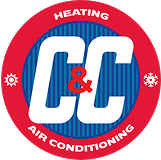High moisture content makes it hard for sweat to evaporate, which can leave you feeling uncomfortable. It also encourages the accumulation of biological contaminants, and once they recirculate throughout the house, they trigger asthmatic attacks and allergic reactions.
Most households rely on an air conditioner during summer to get rid of excess heat and humidity. Besides compromising your family member’s comfort and health, high humidity also affects the AC’s efficiency and longevity. Here are various effects of high humidity on an AC.
1. It Makes the AC Less Energy Efficient
When the air humidity is higher than usual, your AC will have to work extremely hard to eliminate excess moisture. Ideally, the unit works by drawing hot air from the house. It then recirculates it over the evaporator coils. This compartment contains the refrigerant that changes state from liquid to gaseous form when it absorbs heat from the indoor air. The process also draws out moisture from the air and channels it to the condensate drain.
The more air your AC will need to dehumidify, the more energy it will consume. Hence it will cost you more to cool your house in extremely humid months than you would on typical days. The only solution for this is installing a whole-house dehumidifying system. Have a professional connect it to your existing AC unit.
A fan in the dehumidifier will draw warm and humid air. The fan will then pass it over a cold coil, resulting in condensation. The moisture turns into water and flows out via a drainpipe, into a collection tank, and then exits via your home piping. The air released back into the house by the AC will thus be cooler and free from excess moisture. With a dehumidifier, you can better manage both humidity and temperature.
2. High Humidity Strains Your System
During summer, the high temperatures increase the moisture present in the air. As a result, the indoor environment will feel hotter than usual. Therefore, your air conditioner will have to run harder for a more extended period to maintain the desired temperature. Humidity also makes the air thicker, putting more strain on your AC.
Various vital AC components will begin to fail with continued stress, so your system might reach the end of its lifespan sooner than expected. It’s important to note that buying an oversized AC will not help draw out more moisture from your house. This will only make the situation worse.
A bigger AC will cycle on and off often; thus, it won’t efficiently draw out moisture. The powerful compressor will turn the system off before it removes all the humidity from the air. What you need is to have a professional HVAC technician calculate the right AC size for your house. The size will vary based on the square footage of your home, the number of occupants, heat-producing appliances, and the level of insulation.
3. It Results in Excessive Drainage
The more moisture content is in the indoor air, the more the water will condense. Note that if the air has too much humidity, it makes it hard for the drain pan to dry out. It’s normal for your condensate drain to collect water, but if it’s too much, it will leak.
A high amount of moisture can result in the growth of algae in the drain line or condensate pan. As the algae continue to grow, it will clog the condensate drain line. Since the drip pan is shallow, it can overflow and spill water inside your house. This will lead to more humidity problems. It will also damage your property and even encourage mold and mildew growth.
Once the drain line clogs, it causes water backup, which can corrode the drain pipe’s interior parts. The corrosion is impossible to reverse, and you will need to replace the line. Anytime you see water pooling around the AC, call professional technicians immediately. They will assess the cause of the problem, clear the condensate drain, repair worn-out components, and advice on the best cause of action for the humidity issue.
4. High humidity Creates an Opportunity for Particles to Cling to the AC
Excess humidity makes certain parts of the AC very wet. As a result, the water attracts dirt and other dust particles that accumulate and form a layer on the unit. With time, the buildup can make your unit malfunction.
When you expose your AC to humid conditions for a prolonged period, it may begin to rust. This problem significantly affects people living near coastal areas. If salt sprays get into your house, they can land on various AC components like the condenser fan blades, evaporator coils, compressor, and drain pans, causing rust. This weakens the unit’s structural support and can even lead to refrigerant leaks. Note that prolonged exposure to the refrigerant can cause adverse health effects.
Rust can also cause your AC to fail prematurely. Regular AC maintenance is of paramount importance, especially if you reside in highly humid areas. During tune-ups, the HVAC professional will identify dirt buildups and eliminate them before they cause more issues. One of our technicians can also spot early signs of rust and take proactive measures to prevent it from spreading to other components. In case of severe rust on vital parts, replacement might be your only option.
5. Humidity Reduces the AC’s Ability to Improve Indoor Air Quality
In humid regions, the wet conditions in the AC can encourage the growth of molds inside the ducts. Once you turn on your AC, it might recirculate mold spores into the house, which lowers the indoor air quality. It causes a musty odor throughout the house. Your home occupants will also begin to experience some allergic reactions like a runny nose, watery eyes, sneezing, and other respiratory issues.
If you live in highly humid regions, it’s a good idea that you change your air filters often. When clogged, the filters can trap moisture, which encourages the accumulation of biological contaminants. Carbon filters can also help decrease humidity levels slightly.
In Conclusion
The recommended humidity level in a house is around 50% to 60%. You can determine if you have high moisture levels in the home by testing the humidity level using a hygrometer. Some signs of high moisture content in the house are foggy windows, musty odors, a heavy yet warm atmosphere, and clammy skin. If you have an older AC, it’s a good idea that you replace it with a more modern model. Some older units don’t have dehumidifying capabilities found in the latest ACs. Also, run exhaust fans in the kitchen and bathroom to draw out excess moisture produced during bathing or cooking. You can use some indoor plants like Boston ferns that absorb moisture from the air. Dry your clothes outside during humid months, take colder, shorter showers, and install dehumidifiers.
If you need professional help in managing the humidity levels in your house, you can always reach out to C & C Heating and Air Conditioning. We offer humidity control, germicidal lights installation, air purifiers, and filter services. Our company also deals with furnace and AC installation, repair, and maintenance services across Macomb County, MI, and the nearby regions. Call us now to schedule an appointment and try out our exceptional services.





